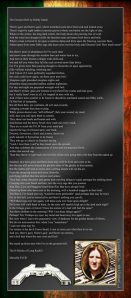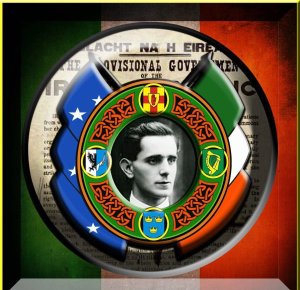There’s gaol and there’s gaol, where wretched souls
have been took and locked away.
There’s eight by eight tombs (concrete graves)
where you barely see the light of day,
Where in the winter, the long dark winter, the body
knows the piercing bite of cold,
And the wind (not draught) chills the heartiest man
and tames both brave and bold,
Where a man is forced to lie upon a mattress damp
and dirty upon the freezing concrete floor,
Naked apart from some filthy rags (the heart cries
out) the body asks”Dearest God! How much more?”
But there’s more in abundance for I’ve seen sleet
and snow come through the window bars and water
turn to ice,
And men in their dozens collapse with chills and
wetand tell you when they fell the cock crowed more
than thrice
For I’ve given more than passing thought to those
who sit upon opportunity (like vultures watching,
watching me)
And I know if it were politically expedient before,
the cock could crow again, set those poor men free!
Sleepless night preceded sleepless nights and
dreamless sleep preceded endless endless nightmare,
For day and night are perpetual wrought with hell
and there’s torture ,pain and torment everywhere
Time comes and time goes, but it really hasn’t went
at all, it’s trapped in here with me,
And if there were comfort to be found in these
dirty mutilated scared and filthy walls, I’d find
lots of sympathy,
But all there here, are contrasts, all evil and
cowards, cringing cowards beat men to pulp,
While prison doctors say “self-inflicted” (lick
your wound, my men) well, dare you call upon them
to consult,
They shear our heads and beards and with
disinfectant and the heavy brush, they wash out
every crack,
They try to scrub the P.O.W from your mind and
imprint the tag of criminal upon your back,
Doctors, Governors, chiefs and screws, there’s no
god’s amount of hypocrites to be found,
They who go to church on Sundays saying “Lord, I
love thee, Lord”as they kneel upon the ground,
And they celebrate the consecration of wine into
his precious blood, within that sacred cup,
Then they throw it right back into his face (when
only going their job) they beat the naked up,
Summer, two have gone and three more may well be
born and come to be,
But the sun will never bronze the ghostly skins of
the ghosts in this eternity
But the tombs will turn to ovens and a stifling
stench will cut the air.
From the decaying waste and urine, from the
putrifying rubbish thatlies strewn everywhere
Then they come, the pests and germs and crawling
things,to squat amongst the stinking mess
Creeping into your beard and hair, into the very
rags that you possess
And flies, Lice and Maggots breed from flies that
have already bred
(Stand up those who have rose in the morning, with
a hundred maggots in their bed)
The Brave, I’ve heard men say “would be more
preferable” (and perhaps that may be true)
For in this hell, you’re buried alive and there’s
nothing you can do,
“Will these legs ever run again, will these eyes
ever feast upon delight?
Do lovers still walk hand in hand, do the stars
still sparkle high up in the dark each night?
Is the foliage green or brown? Does the texture of
a leaf still feel the same?
Are there children in the morning? Will I see these
things again?”
Perhaps! Yes, Perhaps my eyes, my mind and heart
may live again to see,
But only when I leave this panoramic view of
darkness for the golden dream of liberty,
But do not misconstrue this, when I say “sometimes”
I care not what may be,
For torture is the devil I have faced, I care no
more just what they do to me,
And yes, there’s gaol, There’s gaol and there’s an
eternity,
and a hell that burns the very soul and flesh
But stand up those men who live in the greatest
hell,
The H Blocks of Long Kesh!!!
Marcella P.O.W —
 Derry Sceal
Derry Sceal
Related articles
- Sands, (‘Bobby’) Robert (b. 1954) Republican Activist; 1981 Hunger Strike; Anti-H-Block MP April 1981 – May 1981 (fiannaiochta.wordpress.com)
- Palestinian refugees offer letter of solidarity for Marian Price campaign (irishcentral.com)
- Review: Hunger (steadydietoffilm.typepad.com)



 ” The greatest resource that I had were his letters, which frame the story in the times, mostly, when he, his wife and family were apart – so from jail, when he was in America or when Katty was in Liverpool – which also means it is limited in that respect. ” I tried to frame the story first using the letters but I also felt that it was necessary to print the letters in their entirety – so that is the second half of the book,” MacAtasney spent long hours going through the original jail records at the National Archives at Kew, London as well as
” The greatest resource that I had were his letters, which frame the story in the times, mostly, when he, his wife and family were apart – so from jail, when he was in America or when Katty was in Liverpool – which also means it is limited in that respect. ” I tried to frame the story first using the letters but I also felt that it was necessary to print the letters in their entirety – so that is the second half of the book,” MacAtasney spent long hours going through the original jail records at the National Archives at Kew, London as well as  ” His father was a Protestant who was in the
” His father was a Protestant who was in the 











